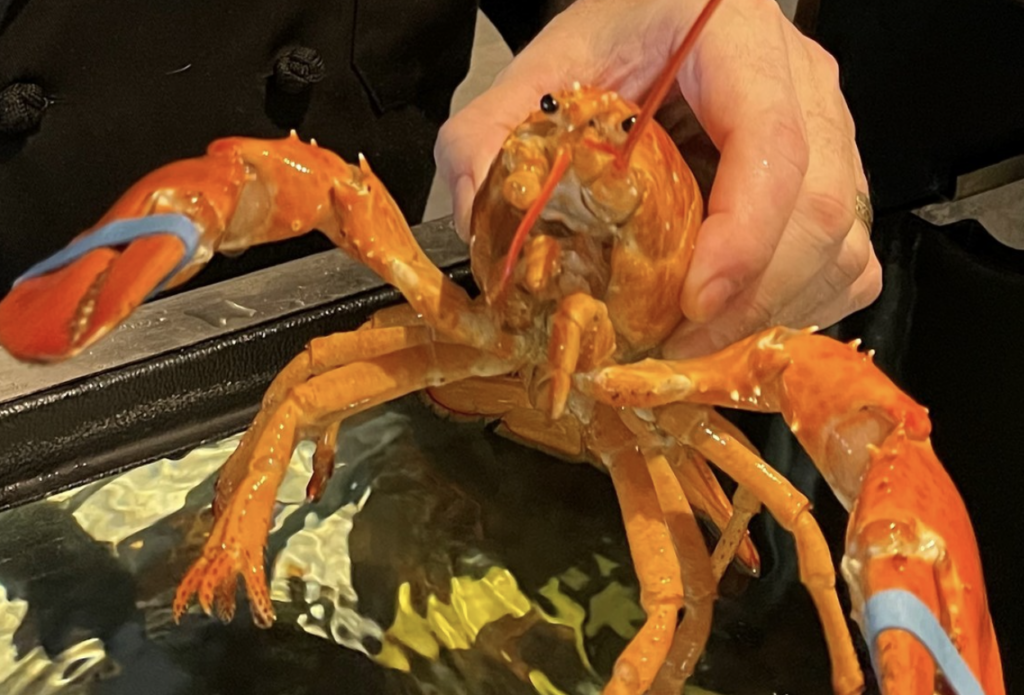What To Consider Before Deciding To Dine On Lobster
The lobster industry in Maine is suing California’s Monterey Bay Aquarium for defamation after customers were advised to avoid buying seafood products harvested in the state.
This article is more than 2 years old

The lobster industry in Maine is suing California’s Monterey Bay Aquarium for defamation after customers were advised to avoid buying seafood products harvested in the state. The lawsuit argues that the aquarium’s conservation program, Seafood Watch, relies on bad science and incorrectly portrays the industry as a threat to endangered whales.
According to NBC News, Seafood Watch put lobster from the United States and Canada on its 2022 list of seafood to avoid as whales were being entangled in harvesting gear. There are only 340 right whales inhabiting the waters in North America. Their numbers have also declined in recent years, making them an endangered species.
But the lobster industry insists these claims are false, with the Maine Lobstermen’s Association asking the U.S. District Court in Maine to force Seafood Watch to remove defamatory statements from its website. The state also requests unspecified monetary damages to cover lost income related to the false information.
“This lawsuit will help eradicate the damage done by folks who have no clue about the care taken by lobstermen to protect the ecosystem and the ocean,” Chief Executive Officer of Bean Maine Lobster Inc John Petersdorf said in a statement via NBC News. But Seafood Watch says its recommendations are correct and evidence-based.
As such, the conservation agency says right whales are vulnerable to entanglement in lobster fishing gear. Spokesman for the aquarium, Kevin Connor, believes the lawsuit ignores evidence that fisheries pose a severe risk to the survival of the North Atlantic right whale. He says the industry seeks to curtail the First Amendment rights of an institution that educates people about the importance of conservation.
Additionally, the Marine Stewardship Council suspended the Maine lobster industry’s sustainability certification in 2022 due to conservation concerns, Associated Press reports. The loss of the agency’s recommendation caused several retailers to stop selling their prize products. The industry could suffer further repercussions from the decision and the newly minted lawsuit.
Lobstermen in Maine have also rallied against the notion that harvesting shellfish is bad for whales. They say there is no data to prove that lobster ropes have harmed an endangered whale by entanglement in almost two decades. The last whale known to suffer difficulty in harvesting ropes in Maine was in 2004, The Washington Post reports.
The Seafood Watch classification and the suspension from the Marine Stewardship Council prompted a flurry of letters and legislation from a congressional delegation defending the Maine lobster industry. Lawmakers in the region have also insisted that there is no proof that lobster harvesting is driving right whales toward extinction.
Sixth-generation lobsterman Gerry Cushman told the publication that, along with his co-workers, he would protect the ocean and its wildlife. “Our stewardship practice is a tradition that defines what Maine is all about,” he explained about lobster fishing. “The barrage of lies about Maine fishing practices must be confronted and defeated by truth.”
The lobster industry in the United States is primarily based in Maine and brought in 98 million pounds of lobster in 2022. This particular seafood is viewed as a delicacy that foodies have enjoyed for centuries. The dish is often reserved for special occasions and served at high-end restaurants.
Lobster, like seafood, comes with genuine sustainability concerns. Overfishing and poor harvesting practices have led to a decline in lobster populations in some areas. To ensure that you’re making an ethical and sustainable choice, look for restaurants and markets that source their seafood from responsible sources.




